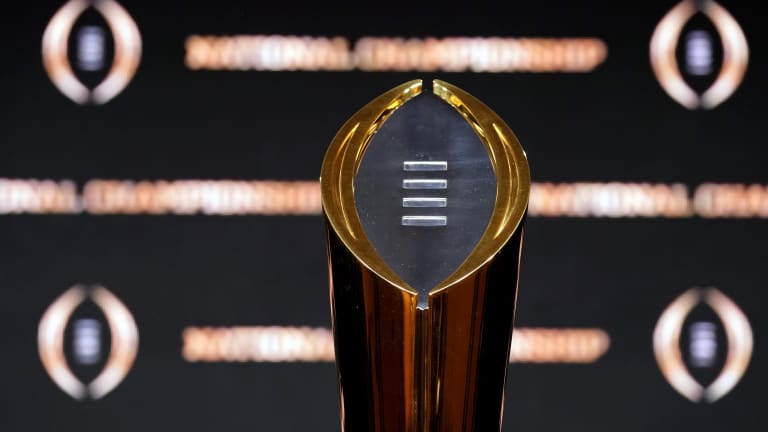
A Jersey Guy: Pac 12 Needs to Prove it’s CFP Worthy

They are not on probation.
Or even double-secret probation.
No one is even questioning their status as a Power 5 conference.
Maybe they should.
Maybe it's time for the Pac-12 to show its other four Power 5 Conference brethren it still deserves a seat in the main dining room.
Maybe it's time to put them on the clock—and not Pacific Coast Time—with the implication clear: Show us SOMETHING, which justifies a guaranteed spot for Final Four consideration for the Pac-12 champion.
Maybe the Pac-12 should be put into the Group of 5 category where they have to earn a spot for CONSIDERATION.
The Pac-12 made headlines last week when it announced that Commissioner Larry Scott would be finishing his 12-year run in June.
The reaction throughout college athletics was not No more Donald Trump relief, but it was met with an almost universal nod of approval, with a quiet "It's about time'' addendum.
Scott came to the then Pac-10 in 2009 as the ultimate outsider, a Harvard educated head of the Women's Tennis Association.
Scott had grandiose plans for a conference which had been a nice, almost mom-and pop geographically concentric group of schools, which generally went its own way on most athletic issues.
Oh, the Pac-10 could compete, but only with a few dynastic entries such as USC football and UCLA basketball.
As a group, they seldom left deep footprints.
With the era of conference expansion, the Pac-12 wanted to expand its footprint, if not its profile.
He thought big—going after Texas and Oklahoma—and came up less than big with Utah and Colorado.
Scott immediately declared the Pac-12 as a major player by negotiating a 12-year, $3 billion dollar television deal with ESPN and Fox.
He also put together the Pac-12 television network which also looked bright and shiny and appeared to be the path of the future for all the major conferences.
While this was going on, post season college football was evolving from the BCS to the CFP Final Four.
But something was missing—the Pac-12.
Not only in football, but in men's college basketball, the two major cash cows for NCAA sports.
The drought in both sports is well into its second decade with some harsh numbers to ponder.
In football, since 2000, the Pac-12 has had one national champion (USC 2005), and only four championship game appearances, including only one (Oregon in 2015) in the last 10 years. Oregon is the only Pac-12 team to make the Final Four in the seven-year run of the CFP.
In men's basketball, the drought has even been more severe.
The last Pac-12 team to win a national championship was Arizona in 1997. UCLA in 2008 was the last Pac-12 team to reach the Final Four.
Such lack of ultimate success might have been tolerated if the Pac-12 had kept pace with the increasingly large money contracts the other major conferences were signing.
The once shiny deal in which the Pac-12 (with the addition of Colorado and Utah) paid its schools $32 million each year has rapidly lost its luster.
The Big Ten ($55 million), SEC ($45 million), Big 12 ($38 million) and ACC ($35 million) all projected larger revenue shares.
But there were other Pac-12 issues which haunted Scott, who made a deal for the Pac-12 network to not have Fox or ESPN as a television partner, which left only Direct TV, a move which left 80 percent of the Pac-12 viewer base blacked out of conference games.
Scott, who is being paid $5 million per year, spared no expenses in his own luxury items, while calling for economic cutbacks in other areas.
The confusion and disaster in scheduling created by COVID-19 and the indecisive way the Conference office handled things created rumblings of discontent throughout the conference.
In announcing the departure of Scott, University of Oregon President Michael Schill said, "The intercollegiate market place doesn't remain static. And now is a good time to bring in a new leader who will help us develop our go forward strategy.''
Where that leadership comes from remains a mystery, but it seems obvious that the Pac-12 needs to stay within the collegiate administrative box this time—perhaps a veteran athletic director, similar to what the ACC did in hiring Northwestern athletic director Jim Phillips to replace Commissioner John Swofford.
It is a good job, maybe even a great job, but probably not a $5 million a year great job.
The waters in collegiate athletics will not be calm for years to come, which will require progressive leadership.
Scott clearly was over his head or oblivious to many issues.
Right now, the Pac-12 is not taken seriously by many people.
There is a leadership issue, as well as a philosophical question of whether college football and basketball success, aka championships, are priority items.
If the Pac-12 wants to continue to be seated at the adult table, the next commissioner should be aware of that and be prepared to carry on.